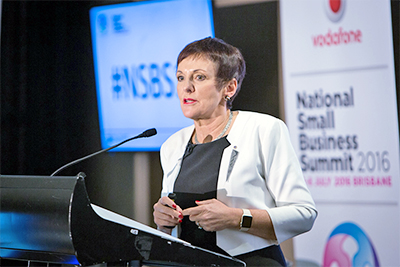Ombudsman sounds alarm for small businesses as debt to ATO soars
THE retiring Australian Small Business and Family Enterprise Ombudsman, Kate Carnell has urged the Australian Taxation Office (ATO) to refrain from returning to heavy-handed tactics, "with collection action expected to ramp up as debts owed hit a record high".
Ms Carnell said she was concerned small businesses may be subjected to the harsh debt recovery actions inflicted prior to the COVID crisis, given collectable debt owed to the ATO has peaked at $34 billion – the majority of which is owed by small business ($21 billion).
“The ATO rightly took a softer approach towards small businesses during the COVID crisis, but we don’t want to see a return to the extreme enforcement actions my office brought to light just a couple of years ago,” Ms Carnell said. “Previous actions such as garnishee notices have crippled small businesses, so it is critical the ATO uses its powers proportionately and appropriately, particularly as small businesses work to get back on their feet.”
The Ombudsman has called for a range of reforms to address her concerns regarding the ATO’s treatment of small businesses in a new report: A tax system that works for small business.
 Recommendations include waiving interest and penalties for a first offence, restricting ATO review and audit periods to one year when a small business is using an accredited tax or BAS agent and immediately ceasing debt recovery action against a small business that is seeking a review of its tax position, regardless of whether the dispute is before the AAT.
Recommendations include waiving interest and penalties for a first offence, restricting ATO review and audit periods to one year when a small business is using an accredited tax or BAS agent and immediately ceasing debt recovery action against a small business that is seeking a review of its tax position, regardless of whether the dispute is before the AAT.
“It’s important that small businesses in dispute with the ATO are given a fair go,” Ms Carnell said.
“The ATO quite reasonably sees its role as an enforcer of taxation laws, but too often it loses sight of the people running the business. This is particularly evident in the area of debt collection, but it’s exacerbated by our overly complicated tax laws.”
The report focuses on small, achievable changes to the tax system that would make a huge difference to small businesses.
This includes making compliance easier by allowing small businesses to opt-in to GST being collected and remitted directly to the ATO at the electronic point of sale as well as income averaging measures that would help small businesses pay the right amount of tax in good years and bad.
“Tax compliance costs small businesses about $90 per $1,000 turnover (according to the NAB Supporting Economic Recovery – what we can do for small business report) - about 225 times more than the cost for big business ($0.40 per $1,000 turnover),” Ms Carnell said.
“Under the current system, small businesses are the ATO’s unpaid tax collectors including everything from the GST to PAYGW.
“Over the past few decades, administration responsibilities have shifted from the government to small businesses, which face significant penalties and interest if an honest mistake is made.
“That’s why our report makes a number of recommendations to take this unnecessary burden off the shoulders of small businesses. At the end of the day the taxation system should be easy to get right and hard to get wrong.
“Now is the time to deliver a system that works for the small business sector and will allow them to achieve greater productivity, return to profitability and grow employment – especially given so many small businesses have endured enormous challenges over the past 12 months.”
ends
*

 How to resolve AdBlock issue?
How to resolve AdBlock issue?